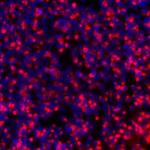
Research Topics
Elizabeta Gjoneska, Ph.D., leads the Neuroepigenomics Group and holds a secondary appointment in the NIEHS Epigenetics and Stem Cell Biology Laboratory. Her group combines molecular, cellular, and genomic tools with genetic in vivo approaches to investigate the mechanisms underlying microglia dysfunction during neurodegeneration.
Microglia, the resident immune cells of the brain, were first described as sensors of pathological events. However, evidence showing that systemic inflammation can exacerbate symptoms of neurodegeneration, including cognitive decline during Alzheimer’s disease (AD), has revealed an active role for microglia in the disease progression. Moreover, identification of disease associated genetic risk variants that perturb microglia function further reinforced the notion that microglia are not just responding, but actively contributing to neurodegeneration.
Gjoneska’s postdoctoral work profiling transcriptional and chromatin changes in mouse models of AD-like neurodegeneration and post-mortem brains of AD patients provided key evidence for the essential role of microglia in AD progression. The high throughput studies led to the identification of noncoding DNA regions that regulate gene expression changes underlying AD. Importantly, they demonstrated that regions which regulate immune response pathways were specifically enriched for AD-associated genetic risk variants, thus suggesting that genetic predisposition to AD is encoded in the brain’s immune function. These studies also identified key proteins, such as transcriptional regulators and chromatin modifiers that target AD-relevant regulatory regions and mediate gene expression changes during AD. Ongoing studies in the group are aimed at dissecting the mechanisms by which genetic and environmental risk factors alter the function of regulatory proteins and lead to microglia dysfunction and increasing susceptibility to AD.
Another line of investigation in the Neuroepigenomics Group is focused on understanding the molecular mechanisms by which maternally induced fetal brain inflammation primes the adult brain for neurodegeneration. The group is particularly interested whether the memory of maternal immune activation (MIA) can be passed down to subsequent generations, suggesting a role for epigenetic mechanisms in transgenerational inheritance of disease potential.
Biography
Gjoneska received her Ph.D. in Chromatin Biology and Epigenetics from Rockefeller University where she studied epigenetic mechanisms that regulate gene integrity and expression in the laboratory of David Allis, Ph.D. Following her Ph.D., she completed her postdoctoral work with Li-Huei Tsai, Ph.D., at the Massachusetts Institute of Technology (MIT). While at MIT, Gjoneska led an effort to characterize the mechanisms underlying gene expression changes during neurodegeneration resulting in identification of noncoding regulatory regions and key transcriptional regulators relevant to AD. Her work, which was part of the larger NIH Roadmap Epigenomics Consortium, provided important insights into the molecular mechanisms of AD, demonstrating that genetic predisposition to the disease is encoded in the brain’s immune function. Gjoneska joined NIEHS November 2019.
Selected Publications
- Ralvenius WT, Mungenast AE, Woolf H, Huston MM, Gillingham TZ, Godin SK, Penney J, Cam HP, Gao F, Fernandez CG, Czako B, Lightfoot Y, Ray WJ, Beckmann A, Goate AM, Marcora E, Romero-Molina C, Ayata P, Schaefer A, Gjoneska E, Tsai LH. A novel molecular class that recruits HDAC/MECP2 complexes to PU.1 motifs reduces neuroinflammation. J Exp Med. 2023;220(11).
- Pao PC, Patnaik D, Watson LA, Gao F, Pan L, Wang J, Adaikkan C, Penney J, Cam HP, Huang WC, Pantano L, Lee A, Nott A, Phan TX, Gjoneska E, Elmsaouri S, Haggarty SJ, Tsai LH. HDAC1 modulates OGG1-initiated oxidative DNA damage repair in the aging brain and Alzheimer's disease. Nat Commun. 2020;11(1):2484.
- Amal H, Gong G, Gjoneska E, Lewis SM, Wishnok JS, Tsai LH, Tannenbaum SR. S-nitrosylation of E3 ubiquitin-protein ligase RNF213 alters non-canonical Wnt/Ca+2 signaling in the P301S mouse model of tauopathy. Transl Psychiatry. 2019;9(1):44.
Related Scientific Focus Areas




Molecular Biology and Biochemistry
View additional Principal Investigators in Molecular Biology and Biochemistry

This page was last updated on Thursday, May 18, 2023